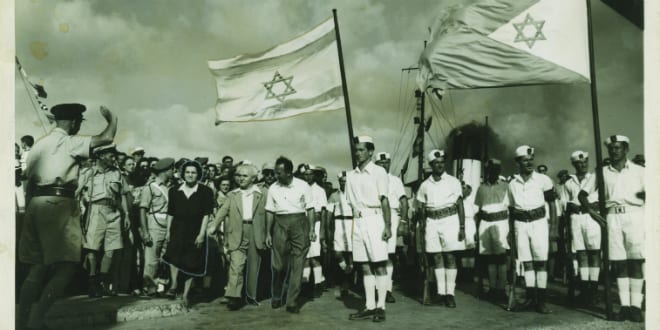A collection of 26 photographs which were designated to be printed by newspapers during Israel’s War of Independence was revealed this past week. Several of the photos captured scenes that transpired on the Arab side of the war. One particularly fascinating photo depicts Arab forces at the port in Haifa surrendering to the IDF and Palyam (naval corps) soldiers who were waving the Israeli and Navy flags at the port for the very first time. The Israeli fighters are also seen welcoming the first Israeli Prime Minister, David Ben-Gurion. The collection of photos will be put up for public auction next week in the Kedem Auction House in Jerusalem.

Among other fascinating scenes depicted in this rare photo collection include an Egyptian warplane being downed on a beach in Tel Aviv; a photo of Jordanian King Abdullah I and the Iraqi Regent Abd al-Ilah in Oman dressed in military garb only several weeks before the Arab armies invaded the State of Israel; and an altered photo of propaganda appearing to show a Palmach soldier surrendering to Arab soldiers. In actuality, the “Palmach soldier” was an Arab man dressed in an IDF uniform.
Jerusalem, which was under siege by Jordanian forces at the time, was in dire need of water, food, ammunition, and medicine. Armored caravans carrying truckloads of equipment were dispatched to Jerusalem to provide for the residents. Some of the photos show sabotage attempts by Arab fighters including an image of an Arab guerrilla fighter ambushing Jewish caravans 8 km southwest of Jerusalem on Mount Caste and one of an Arab sharpshooter puncturing a water pipe that led to a Jewish community near Jerusalem. Arab women are also seen waiting on line in Jerusalem to receive rations of cooking oil.

Simultaneously in Haifa, the battle raged on for a bloody five months. As a mixed city under the British Mandate Palestine, the port in Haifa was one of the primary locations where Jews and Arabs worked side by side in relative harmony. Before the British ended the mandate, the Palmach had founded its naval corps under the command of Yohai Ben-Nun in an effort to ensure security for the port’s Jewish workers. Palyam’s significant role in protecting the workers was demonstrated on at least several occasions. During one such incident on February 4, 1948, members of the Palyam were urgently summoned to rescue two Jewish tractor drivers who were being chased away from their workplaces on the eastern section of the port by way of verbal threats and even gunshots. The Palyam members arrived at the scene with weapons in hand causing hundreds of Arab laborers to flee and ensuring the safe return of the Jewish workers.
Ben-Nun was subsequently invited to a discussion with several Arab dignitaries who explained that the escalation in hostilities was caused by non-laborers who were attempting to sabotage the peaceful coexistence at the port. The dignitaries also pledged to expel such individuals from the area. The fierce efforts and stance of the Palyam guaranteed the continuity of Jewish labor at the port that prevailed up to and proceeding the liberation of all areas of the city by the Haganah in April of 1948.

Maron Eran, co-owner of Kedem Auction House, which will be putting the photograph collection up for sale in the coming days, remarked: “We were excited with this remarkably rare and valuable collection. We hope it will reach the right owners who will put the photographs on exhibit in one of the many memorials or libraries documenting the history and achievements of the State of Israel in the years leading up to her independence.”



Source: Israel in the News
